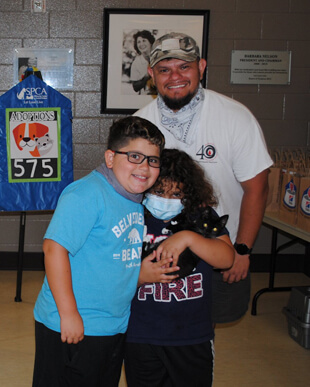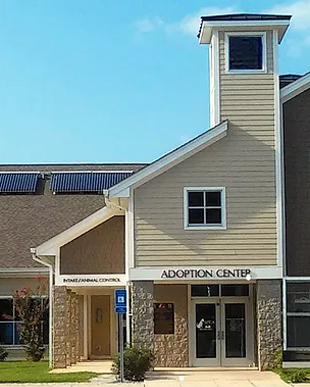SAVE A LIFE. ADOPT A PET.

Looking for a new pet, or simply want to browse some adorable animals? Meet our currently adoptable shelter pets before adopting!

Adoption Application
Ready to take home your new, forever friend? Download & Print our Adoption Application and bring it to 199 Willow Run Road, Aiken to adopt your best friend!
Come meet your new best friend at the SPCA Albrecht Center. Our staff is happy to help find the best fit for your family.
ADOPTION FEES
Dependent on size, age and type of animal, adoption fees vary and include necessary veterinary care to keep your new adoptee happy and healthy. Typically, adoption fees range from $75 – $125 for cats & kittens and $75 to $250 for dogs & puppies. These adoption fees cover only a portion of the cost it takes to prepare our shelter pets for adoption, but allows us to continue providing food, enrichment, supplies and the following vet care to ensure a quality of life for every soul that passes through our doors:
ADOPTION FEES INCLUDE:
- Spay/neuter
- Age-appropriate vaccinations
- Microchip
- Deworming
- Heartworm testing (adult dogs) & treatment (if needed)
- Feline leukemia testing (kittens and cats)

SENIORS FOR SENIORS Adoption Program
Adopters over the age of 60 can always adopt a senior pet dog or cat (ages 6+) for just $6!
THINGS TO CONSIDER BEFORE ADOPTING
Why do I want a pet?
Adopting a pet because the kids have been asking for a puppy or a kitten usually ends up being a big mistake. If you have children under six years old, for example, you might consider waiting a few years before you adopt a companion animal. Problem free, responsible pet ownership requires children who are mature enough to properly handle and help care for your new pet. Are you prepared to handle accidents in the house, soiled or torn furniture and unexpected medical emergencies? These are common aspects of pet ownership.
Will I make time for a pet?
Dogs, cats and other companion animals cannot be ignored just because you or the children are too tired or too busy. They require food, water, exercise, enrichment, care and companionship every day of every year. Thousands of animals end up in shelters or are humanely euthanized because their owners did not realize how much time it took to properly care for their pet.
Can I afford a pet?
The adoption fee is just the beginning of a lifetime of expenses. The list below is just a few of the items that your pet might need each month, bi-annually or annually:
Vaccines, Heartworm test, Heartworm prevention pills, Leukemia test, Leukemia prevention shot, Basic health exam, Microchipping (implanted I.D.), Flea control (varies depending on size), License, Food, Grooming, Cat litter, Litter box & scoop, Collars & leashes, Toys, Pet bed, Pet carrier.
Please note that this list is based on a 15-year life expectancy and does not include all the expenses you will incur.
Don’t forget training, illness, treats, bowls, a doghouse, kennel fees, etc. It is estimated that the average cost per year of owning a cat or dog is about $1,000.
Can I have a pet where I currently live?
How many times do I think I’ll move in the next 15 years?
Many rental communities either don’t allow pets or have restrictions as to the type of pets they allow. It is not uncommon for landlords to require an additional deposit if you own a pet. If you might move within the next 15 years, are you willing to move the pet too, and restrict your choice of housing to places where pets are allowed and where they will have the space they require?
How will I care for this pet while I am on vacation?
You will need reliable friends, relatives or money to pay for a boarding kennel or pet sitter.
Is this the right pet for me and my lifestyle?
Adopting a large or energetic dog to share your small apartment, for example, is probably not going to be successful. Some breeds of dogs require a lot of physical and mental exercise, and if you are not willing to commit the time and energy required to properly care for these dogs it is likely they will display their frustration with any or all of the following behaviors: barking, digging, chewing or jumping.
Look at your lifestyle and then do some research to determine the pet that will best fit in with you and your family. There can be a long list of questions and things to consider but a quick stroll through an animal shelter will illustrate why answering these questions before you decide to adopt is so important. Remember, thousands of unwanted animals end up in shelters every year and far too many of these homeless animals end up being euthanized simply for lack of space, funding and resources.
PUPPY, KITTEN or ADULT?
KITTEN vs CAT
- Kittens are often poor matches for young kidsKittens can play rough and have sharp claws that can hurt young children. Young children, in turn, can handle a kitten too roughly and cause injury. An adult cat can be more patient with young kids, and best of all, knows when to walk away from interactions that are too much for either of them.
- Kittens can also be bad matches for homes with resident animalsDogs may play too roughly or worse yet, mistake the kitten as prey. Adult cats are more able and confident in setting boundaries with dogs. Resident adult cats often resent the playfulness of a young kitten, and would settle in faster with an adult housemate.
Adopting an adult cat can bring the easiest and sweetest rewards
Domestic cats, especially those living exclusively indoors, often live to be 20 years old or older. By adopting an adult cat you are taking a stand against the pet overpopulation crisis, and your efforts will be appreciated daily through the purring thanks of your new cat. Adopting a kitten or cat is a big responsibility, and there are many Things To Consider Before Getting A Pet.
PUPPY vs DOG
- Young puppies require large amounts of your timeThey need to be fed 3-4 times a day, kept in a confined area indoors, and let out every few hours to eliminate. The first few weeks can be filled with sleepless nights as the confused puppy seeks comfort and food.
A puppy’s growth phase requires much supervision and training
House-training is accomplished only after accidents. Teething (“chewing”) lasts the first six-eight months. And puppies don’t become mature adults until they are two years old, meaning they act like teenage dogs for a year or more. If everyone in your home is gone for eight hours a day, your puppy probably won’t get the attention he needs to meet your expectations. If you are gone much longer than eight hours a day, even adult dogs have high attention needs and may not be a good choice for your current lifestyle.Adopting an adult dog has many advantages
Most dogs given to shelters are young adolescents. They don’t usually have behavior problems; they were just victims of well-meaning owners who didn’t have the time, knowledge or patience for the needs of a dog. While many shelter dogs could use a little more training, they usually bond quickly with new owners, and have fewer needs than a young puppy. Many shelter dogs are already house-trained, though they often need some reminders and a few days of adjustment time after their stay at a shelter. Even if they were sadly kept outdoors only, adult dogs often only need a day or two to learn that they live inside, but eliminate outside.Many shelter dogs have already lived with children
People often assume that they should start with a puppy if they have children. Puppies have sharp baby teeth and can play too roughly with young children. There are many adult dogs in the shelter that are recommended for households with children. And, teaching children about the moral benefits of saving the life of a homeless adult pet is a lesson that will never be forgotten.Adult dogs are easier to train than young puppies because they have longer attention spans
And many shelter dogs already know some basic commands taught in their first home or by shelter volunteers. Dogs in our shelter are enrolled in our Phideaux (pronounced Fido) University train-to-adopt program, where staff and volunteers teach them basic good behaviors like sit, wait, down, and to walk on a leash without pulling.Dogs are generally more predictable
A dog isn’t full-grown until it’s a year old, so when adopting an adult dog you already know its full size, health and real personality.Dogs seldom mature out of their “teenage phase” until they are two years old
Adopting an older pet means that someone else already had his or her shoes chewed and you get the benefit of a dog who is more mellow and allows you to finish the entire newspaper.Don’t discount a dog that is approaching a senior age
Even an eight-year-old dog has the likelihood of many more good years to give you. A senior dog often offers the sweetest rewards. And if you’re a senior yourself, you can take advantage of our Seniors for Seniors program–if you’re at least 60 years old, and the pet you choose is at least 6 years old, the adoption fee is just $6!You are taking a stand against the pet overpopulation crisis and saving an animal that will bond quickly with you, and shower you with gratitude and unconditional love. All dogs are social animals and have a high need for regular companionship and attention inside the home with their humans. If you are gone much longer than eight or nine hours a day, a dog may not be an appropriate pet for your busy lifestyle. Adopting a puppy or dog is a big responsibility, and there are many things to consider before getting a pet.


